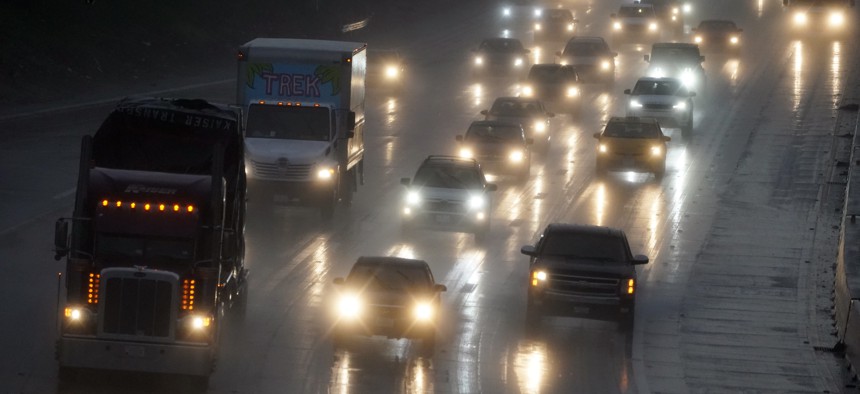Automakers Drop Opposition to California’s Vehicle Emissions Authority

Traffic makes its way on a rain-soaked Interstate 5, Monday, Dec. 28, 2020, in Sun Valley, Calif. AP Photo/Marcio Jose Sanchez
President Biden has directed federal agencies to reconsider fuel efficiency and emissions standards set during the Trump administration and automakers said they hope to work with the White House on the new rules.
A coalition of automakers this week dropped their support for the former Trump administration’s effort to block California from setting its own vehicle emissions standards.
The announcement comes as the Biden administration is directing federal agencies to reconsider Trump’s decision to revoke California’s emissions-setting authority and to revisit fuel efficiency standards.
The Coalition for Sustainable Automotive Regulation, which represents Hyundai, Kia, Mazda, Mitsubishi, the National Automobile Dealers Association, Subaru, and Toyota, said it withdrew from an ongoing lawsuit involving California’s emissions authority and hopes to work with the Biden administration on new rules.
“In a gesture of good faith and to find a constructive path forward, the CSAR has decided to withdraw from this lawsuit in order to unify the auto industry behind a single national program, with ambitious, achievable standards,” the group said in a statement.
California has for decades had the authority to set stricter regulations than the federal government on tailpipe emissions. Because of the large auto market in California, the state’s standards have become de facto guidelines for auto manufacturers who want to sell cars in the United States. At least 13 states have also adopted California’s standards.
General Motors announced after the election that it would abandon the Trump-led effort targeting California’s emissions rules and five other automakers—Ford, Honda, BMW, Volkswagen and Volvo—pledged last year to abide by California’s tougher standards.
The Trump administration sought to resume control of setting national standards by revoking California’s waiver and it finalized its rollback of Obama-era vehicle fuel efficiency standards last year. Numerous states, environmental organizations, and industry and public interest groups filed lawsuits challenging the decisions, which were consolidated into a case that remains pending in federal court.
The Biden administration is now reviewing regulations enacted under the previous administration that do not align with its own environmental policy goals. With that review underway, the U.S. Department of Justice this week asked the U.S. Appeals Court for the District of Columbia to put the case on hold while federal agencies reconsider the Trump administration’s decisions.
A coalition of 12 states, led by Ohio’s Republican Attorney General Dan Yost, that challenged California’s emission-setting authority said they oppose efforts to put the case on hold. In court documents filed Wednesday, the states argued that the case should be allowed to proceed so the court can determine whether it is constitutional for the federal government to grant California a waiver.
“It would behoove all the parties to know the answer to that question before, not after, the federal government considers again whether to grant California a waiver,” attorneys general for the states wrote in the court filing.
After revoking California’s waiver, the Trump administration set new standards for vehicles’ carbon dioxide emissions. Those standards require automakers to reduce emissions by 1.5% each year through 2026. Cars and light trucks are projected to average 40.4 mpg under the new rules.
Standards enacted by the Obama administration would have required 5% reductions each year and resulted in an average of 46.7 mpg fuel efficiency.
Andrea Noble is a staff correspondent with Route Fifty.
NEXT STORY: After Years of Pollution, One County Meets Air Quality Standards for the First Time Ever





